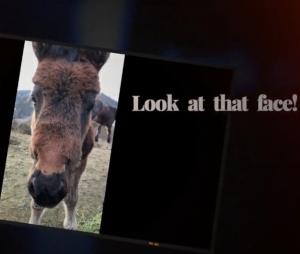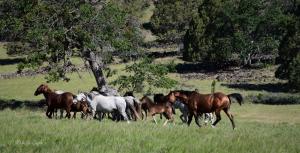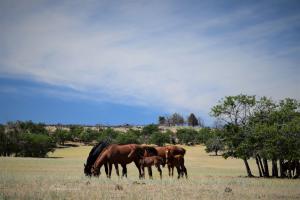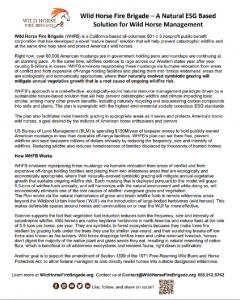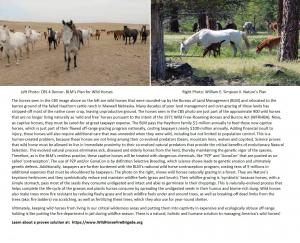Nonprofit 'Wild Horse Fire Brigade' Takes Leadership Role in Wild Horse Advocacy with Best-In-Class 'ESG'
ESG represents 'environmental, social and governance,' providing enhanced stakeholder-centric approach to conducting business, in this case, nonprofit business
YREKA, CA, US, March 1, 2023 /EINPresswire.com/ -- Wild Horse Fire Brigade (WHFB) is a California-based all-volunteer 501-c-3 nonprofit public-benefit corporation that has developed a novel “nature-based” solution that will help prevent catastrophic wildfire and at the same time help save and protect America’s wild horses.Right now, over 60,000 American mustangs are in government holding pens and roundups are continuing at an alarming pace. At the same time, wildfires continue to rage across our Western states year after year causing $-billions in losses.
WHFB envisions repurposing these mustangs via humane relocation as family units from areas of conflict and from expensive off-range holding facilities and placing them into ‘critical wilderness’ areas that are ecologically and economically appropriate, where their naturally evolved symbiotic grazing will mitigate annual vegetative growth that is a root cause of ongoing wildfire risk.
WHFB’s approach is a novel, cost-effective, ecologically-sound natural resource management paradigm driven by a sustainable nature-based solution that will help prevent catastrophic wildfire and climate impacting toxic smoke, among many other proven benefits, including naturally recycling and sequestering carbon compounds into soils and plants.
How WHFB Works
WHFB envisions repurposing native species American mustangs via humane relocation of family units away from areas where they are deemed to be in conflict with commercial public land use enterprises and from expensive off-range holding facilities and placing them into remote critical wilderness areas that are ecologically and economically appropriate, where their naturally-evolved symbiotic grazing will mitigate annual vegetative growth that sustains ongoing wildfire risk.
Each mustang that is deployed pursuant to this model will graze 5.5-tons of wildfire fuels annually, and will harmonize with the natural environment and while doing so, will economically eliminate one of the root causes of wildfire: overgrown grass and vegetation.
The WHFB Plan works via the natural maintenance of grass and brush wildfire fuels in remote wilderness areas beyond the Wildland Urban Interface (‘WUI’) via the introduction of large-bodied herbivores (wild horses). This makes defensible spaces around homes and communities on or near the WUI far more effective.
Science supports the fact that vegetative fuel reduction reduces both the frequency, size and intensity of catastrophic wildfire. Wild horses are native keystone herbivores in north America and reduce fuels at the rate of 5.5-tons per horse, per year. They are symbiotic to forest ecosystems because they make trees fire resilient by grazing fuels under the trees they use for shelter year-round, and their scratching breaks-off low limbs also known as fire ladders. Wild horse droppings fertilize trees and unlike ruminant livestock, horses don’t digest the majority of the native plant and grass seeds they eat, resulting in natural reseeding of native flora, which is beneficial to all wilderness ecosystems and resident fauna, right down to pollinators.
How Wild Horse Fire Brigade's Plan takes the leadership role in ESG regarding wild horse advocacy:
Positive 'Environmental' Effects
1. Reduced catastrophically-hot wildfires that incinerate forests, wildlife and wildlife habitat.
2. Reduced toxic wildfire smoke and it's impact on climate change.
3. Reduced need for dangerous prescribed burning that also sends more greenhouse gases (smoke) into the atmosphere. Reduced need for toxic herbicides.
4. Reseeding of native flora cover-crops that enhance ecosystems and co-evolved dependent fauna (deer, birds, pollinators). This also maintains the carbon-sink made-up of living grasses and plants, which also produce oxygen.
5. Grazing wild horses sequester carbon compounds back into the soils via their dung, rich with seeds of native plants.
6. Reseeding of native flora cover-crops enhances refreshment of the aquifer via precipitation and reduces catastrophic erosion and adverse impacts on water quantity, quality. Reduced erosion and water turbidity into steams and rivers benefits fisheries.
Positive 'Social' Effects
1. Reduced frequency, size and intensity of catastrophic wildfires reduces the numbers of homes and businesses incinerated by wildfires, which reduces the numbers of people made homeless by burned homes. Currently, thousands of homes are destroyed by wildfires annually causing thousands of people and families to become homeless. This in turn puts even more stress on publicly-funded social services.
2. Reduced wildfire smoke reduces health impacts of the smoke on the health of humans and children who are most vulnerable.
3. Businesses that are spared being burned or adversely impacted by wildfire and smoke benefit, providing relief from lost jobs and economic impacts.
4. Wildfire related mental health issues are reduced.
5. Rewilded horses saves taxpayers $-millions in costs of off-range holding of wild horses; and reduced wildfires saves taxpayers and insurers $-billions annually, These huge saving can fund other worthy programs that benefit communities and society.
Positive 'Governance'
1. WHFB's board membership is made-up of a diverse group of dedicated people supporting ongoing considerations of the best available science, research and adaptive management principles for the holistic, natural and humane management of American wild horses.
2. WHFB's board is a leader in role-modeling volunteerism at the officer and board-level.
3. WHFB's board supports transparency of operations through extensive stakeholder education and communication.
Wild Horse Fire Brigade is in the business of implementing a nature-based wild horse management paradigm that saves native species American Wild Horses.
And uniquely in the world of nonprofits supporting wild horse advocacy, Wild Horse Fire Brigade's plan to accomplish the goal of saving wild horses is synergistic with the highest environmental socially conscious ESG standards.
What is ESG (Environmental, Social and Governance)?
ESG represents 'environmental, social and governance,' providing an improved stakeholder-centric approach to conducting business, in this case, a nonprofit business whose mission is to: Reduce catastrophic wildfire and save American Wild Horses through better management.
ESG is based on the principle that the environment is one of several important factors in determining an organization's commitment to sustainable solutions. As ESG increasingly becomes top of mind for company directors, it’s important to consider holistic impacts of sustainable conservation solutions.
To help frame the concept and understanding of ESG, we can identify some the issues and how they fit into the categories of environmental, social and governance. Examples in multiple corporate business segments might include these issues and categories:
Environmental - Preservation of our natural world
• Climate change
• Carbon emission reduction
• Water pollution and drought
• Air pollution
• Deforestation
• Greenhouse gas emissions
Social
Consideration of humans and our inter-dependencies
• Success for taxpayers and advocates of wild horses and nature
• Gender and diversity inclusion
• Community relations
• Mental health
Governance
Logistics and defined process for running a business or organization
• Board of directors and its makeup
• Transparency of operations
William E. Simpson II
Wild Horse Fire Brigade
+1 858-212-5762
email us here
More Wild Horses Equals Less Wildfire Fuels
Legal Disclaimer:
EIN Presswire provides this news content "as is" without warranty of any kind. We do not accept any responsibility or liability for the accuracy, content, images, videos, licenses, completeness, legality, or reliability of the information contained in this article. If you have any complaints or copyright issues related to this article, kindly contact the author above.

